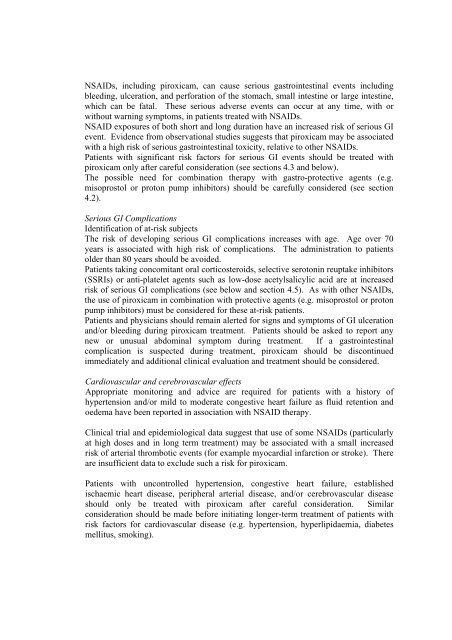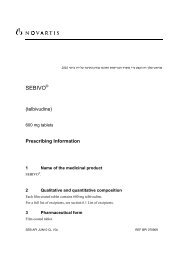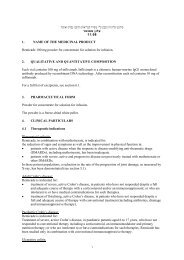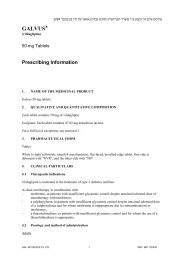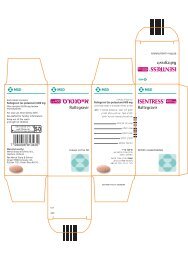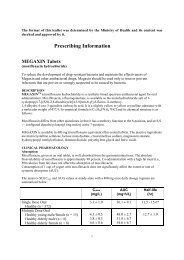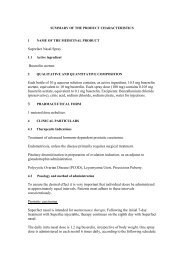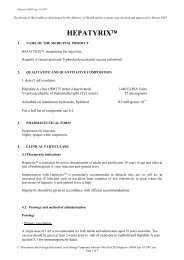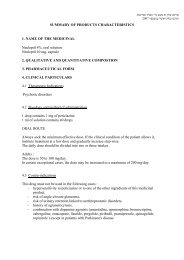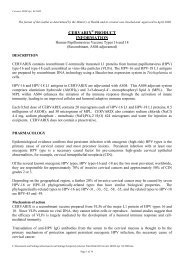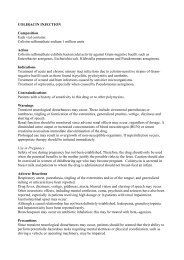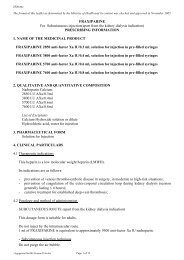BREXIN
BREXIN
BREXIN
Create successful ePaper yourself
Turn your PDF publications into a flip-book with our unique Google optimized e-Paper software.
NSAIDs, including piroxicam, can cause serious gastrointestinal events including<br />
bleeding, ulceration, and perforation of the stomach, small intestine or large intestine,<br />
which can be fatal. These serious adverse events can occur at any time, with or<br />
without warning symptoms, in patients treated with NSAIDs.<br />
NSAID exposures of both short and long duration have an increased risk of serious GI<br />
event. Evidence from observational studies suggests that piroxicam may be associated<br />
with a high risk of serious gastrointestinal toxicity, relative to other NSAIDs.<br />
Patients with significant risk factors for serious GI events should be treated with<br />
piroxicam only after careful consideration (see sections 4.3 and below).<br />
The possible need for combination therapy with gastro-protective agents (e.g.<br />
misoprostol or proton pump inhibitors) should be carefully considered (see section<br />
4.2).<br />
Serious GI Complications<br />
Identification of at-risk subjects<br />
The risk of developing serious GI complications increases with age. Age over 70<br />
years is associated with high risk of complications. The administration to patients<br />
older than 80 years should be avoided.<br />
Patients taking concomitant oral corticosteroids, selective serotonin reuptake inhibitors<br />
(SSRIs) or anti-platelet agents such as low-dose acetylsalicylic acid are at increased<br />
risk of serious GI complications (see below and section 4.5). As with other NSAIDs,<br />
the use of piroxicam in combination with protective agents (e.g. misoprostol or proton<br />
pump inhibitors) must be considered for these at-risk patients.<br />
Patients and physicians should remain alerted for signs and symptoms of GI ulceration<br />
and/or bleeding during piroxicam treatment. Patients should be asked to report any<br />
new or unusual abdominal symptom during treatment. If a gastrointestinal<br />
complication is suspected during treatment, piroxicam should be discontinued<br />
immediately and additional clinical evaluation and treatment should be considered.<br />
Cardiovascular and cerebrovascular effects<br />
Appropriate monitoring and advice are required for patients with a history of<br />
hypertension and/or mild to moderate congestive heart failure as fluid retention and<br />
oedema have been reported in association with NSAID therapy.<br />
Clinical trial and epidemiological data suggest that use of some NSAIDs (particularly<br />
at high doses and in long term treatment) may be associated with a small increased<br />
risk of arterial thrombotic events (for example myocardial infarction or stroke). There<br />
are insufficient data to exclude such a risk for piroxicam.<br />
Patients with uncontrolled hypertension, congestive heart failure, established<br />
ischaemic heart disease, peripheral arterial disease, and/or cerebrovascular disease<br />
should only be treated with piroxicam after careful consideration. Similar<br />
consideration should be made before initiating longer-term treatment of patients with<br />
risk factors for cardiovascular disease (e.g. hypertension, hyperlipidaemia, diabetes<br />
mellitus, smoking).


